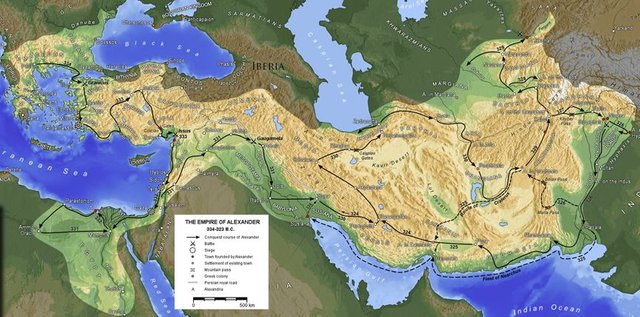325-323 BC The retreat west
But Alexander divides his army: The fleet is to drive along the coast to the mouth of the Euphrates, he himself wants to take the land with an army of more than 20,000 men. But the way through the desert becomes a nightmare. The local leaders get lost, and under the blazing sun the men die row after row. Hardly half of them reach the area after a sixty-day odyssey. Only in the spring of 324, the entire army is gathered again. In Susa Alexander reforms the administration. Several of his satraps are executed for unreliability. On the other hand, he rewarded deserving fighters lavishly. To strengthen the cohesion in the new empire, Alexander married-the two Persian princesses. He also "graces" his closest confidants with women from the Persian nobility, and a mass wedding legalizes the relationships of Greek soldiers with Persian women.
But there is discontent in the army: the Macedonians have long been a minority among the soldiers. They feel set back by Alexander, who increasingly calls Persians into responsible positions and accepts Oriental customs and customs. When Alexander wants to send about 11,000 veteran companions home, they contradict him openly. But the king makes with the mutineers short process: 13 men he can get as a matter of course from the crowd and execute. After a subsequent reconciliation festival, the remaining insurgents have no choice but to return home richly rewarded.
323 BC Alexander's death
Even after the successful conclusion of the campaign in the East, Alexander is far from having reached the goal of his dreams. On the way to Babylon, he is already planning the next campaign. This time he has cast an eye over Arabia. With the conquest of the almost unknown Arabian peninsula he wants to extend his empire south to the natural borders. But in Babylon the bad omens multiply: Seers warn Alexander of an imminent danger, and one day a stranger, wearing a crown and regal garment, sits on his throne. A possible explanation for this is found in an Old Babylonian ritual: A "substitute king" on the throne is to bring about predicted misfortunes and thus protect the real king - but the Greeks do not know this custom. Alexander lets the stranger torture, but he receives no explanation for the alleged sacrilege.
On May 29, 323, Alexander suddenly fell ill with a high fever. Despite all the sacrifices made to the gods, he is so weak after all that he can not even speak. The soldiers move past his camp to greet him one last time.
Alexander dies on the evening of June 10 at the age of 32. When asked who should inherit his kingdom, he answers the legend.

